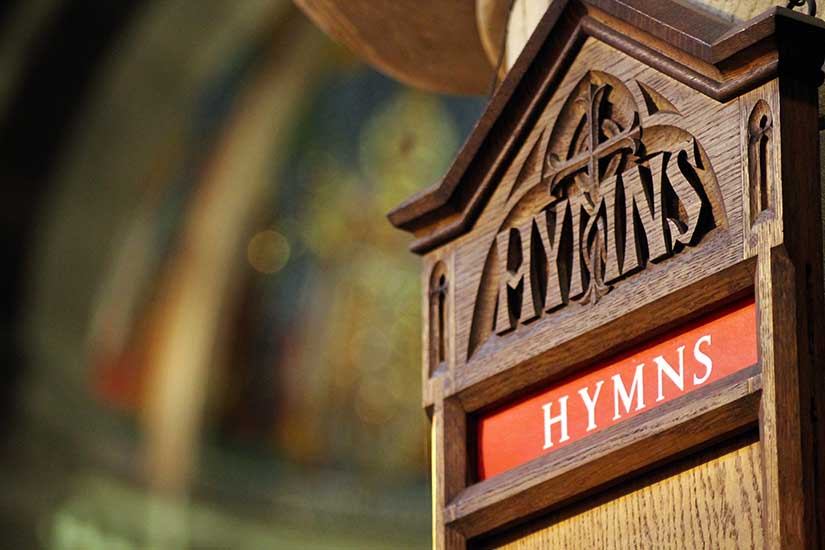Tempting Hymn is about two people of faith—different faiths, actually, which is one of many obstacles the characters must overcome. Jonas is an American Presbyterian missionary, and Rosa is a Filipino Catholic nurse. The book has spiritual elements, but it is not an inspirational romance. (In other words, there is explicit sex. For full content guidance, please go to this page.)
No matter if you are a religious person or not, good music is good music—and that includes hymns. At the school where I teach, we have all-school chapels four mornings a week. The prayers are interfaith and the talks largely secular, but we sing from the Episcopal Church’s 1982 Hymnal at the end of every service. After a while, a person gets to have favorites. She even recognizes hymns by number.
It was during Lessons & Carols that the idea for Jonas and Rosa’s story came to me. I still have the program I ruined with all my scribbles. When ideas come, you do not wait two hours to go home and write them down. No, you borrow a pen and write furiously throughout the entire concert. Was that a little rude? Yes. But, in my defense, I think the choir would have really appreciated how much their singing moved me. When I finished the book, I knew what the epilogue scene had to be.
I chose the other hymns in the book based upon their beauty and meaning. I had to be historically accurate, of course, so I worked from the 1895 revision of The Hymnal, approved by the General Assembly of the Presbyterian Church in the United States of America. Most of the hymns below, and all the ones that became the chapter titles, can be identified by number.

Prologue: “Amazing Grace.” This is one of the few not included in the hymnal mentioned above. Though this early 19th century song was included in earlier Presbyterian versions—for example, it was hymn number 519 in the 1874 Hymnal—they omitted it in 1895 for reasons I cannot fathom. I still used the song. Jonas would have certainly learned it from older versions, and he would have sung it often for his daughter, Grace. Now this song is the single most frequently sung hymn in the Presbyterian Church USA, with more than sixty-six percent of their congregations singing it twice or more per year. For your listening pleasure, I chose Elvis Presley’s version (below) so that I could showcase a male voice. (And, if you want to hear the bass of the tune as a solo, listen to this version by Acappella with Tim Faust. This is how Jonas would have sounded.)
Chapter Two: Number 589, “Come, Thou Fount of Every Blessing.” The reader may not recognize the middle verses I used in the book scene, but they will likely recognize the title of the song. Everyone from Mumford & Sons to the Christian punk band Eleventyseven has covered it. Sufjan Stevens has a wonderful version in his Complete Christmas Collection, but that video was removed from YouTube. Instead, I found this version by Sarah Noëlle, which is lovely:
Chapter Three: Number 524, “Guide Me, O Thou Great Jehovah.” I fudged the history here just a bit. The 18th century words for this song are correct, but do not try to sing the original music. This hymn did not catch on until the tune Cwm Rhondda was written, a year after my character Jonas sings it in the book. I hope you will forgive the anachronism. As befits a Welsh tune by a Welsh composer, the version I have chosen to post here is sung by the Tabernacle Welsh Baptist Church, Cardiff:
Chapter Five: Number 98, “The Spacious Firmament on High.” This is, without doubt, my favorite hymn—and yet it seems to be the least popular to cover. The reason I love it may be the same reason most choirs do not: it is very deist in theology, with a vague “supreme architect” Creator fashioning the universe of planets, stars, and orbs. The hymn is by Hadyn, though, and it’s gorgeous! I chose an a cappella version (by a group named Acappella) because it allows you to hear the bass clearly, though the beat is a little fast:
Chapter Seven: “Adoro Te Devote.” Since this is a Catholic hymn, you will not find it in the Presbyterian hymnal. The mass described in this chapter was a Tridentine Mass (pre-1962 Second Vatican Council), which means it would have been all in Latin, and the hymns would have been Gregorian. Have you listened to Gregorian music? Beautiful, but not catchy. And Latin. Did I mention the Latin? Of the various hymns I listened to, this one has the most identifiable melody, probably because the music was not written until after the seventeenth century. Therefore, it was the best choice for Jonas to sing on the fly:
Chapter Eight: Number 24, “Abide with Me.” I used this song as both a hymn to be sung by Jonas while he fixes the mill, and also, later, as a chapter title. It is the kind of hymn that I think a man with a natural bass would enjoy singing because it stays within his range. The lyrics also tell the story of the big decision he is about to make. The version below is sung by George Beverly Shea:
Chapter Twelve: Number 304, “The Church’s One Foundation.” In the story, I make a point of the different directions the bass and sopranos go in this song—opposite, but complimentary. To hear the bass part only, listen to this great tutorial by BassHymn:
To hear all the parts together, here is a video by King’s College Cambridge:
Chapter Twelve (again): Number 692, “Now the Day is Over.” I found this hymn in the Children’s Services section of the hymnal, and it fits perfectly as a lullaby. This version is by Pat Boone:
Chapter Nineteen: Number 276, “Gracious Spirit, Holy Ghost.” I chose this hymn because of its paraphrasing of the Apostle Paul’s I Corinthians 13. You know the passage I’m talking about:
Love is patient; love is kind; love is not envious or boastful or arrogant or rude. It does not insist on its own way; it is not irritable or resentful; it does not rejoice in wrongdoing, but rejoices in the truth. It bears all things, believes all things, hopes all things, endures all things….And now faith, hope, and love abide, these three; and the greatest of these is love.
I wanted this sentiment in hymn form, which is surprisingly hard to find. Here, at least, is the common tune used for the hymn:
Epilogue: Number 696, “Once in Royal David’s City.” Sitting through this service in December 2013 gave me the seeds of Rosa and Jonas’s story, so I end the book (and this post) with the real deal. No substitutions. In this, the 2015 Groton School Lessons & Carols service, the soprano solo is sung by Phoebe Fry, Form of 2017 (and Barnard College class of 2021). She is a talented singer-songwriter in the folk-pop tradition, so please check out her amazing songs. (The orchestra prelude is wonderful, but you can skip right to the hymn at minute 12:15.) Enjoy!
Thanks for listening, and I hope you enjoy Rosa and Jonas’s story. It is about finding a home for love.


